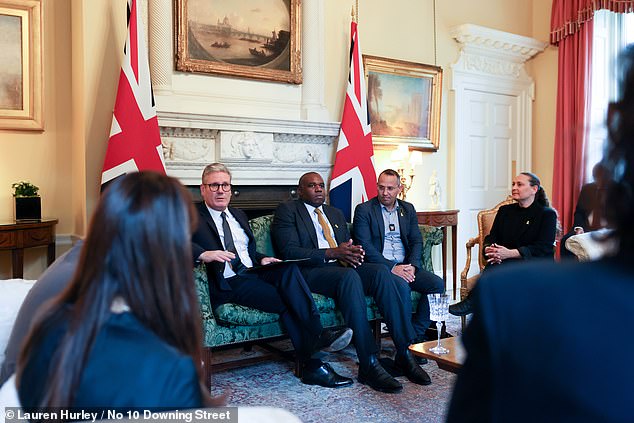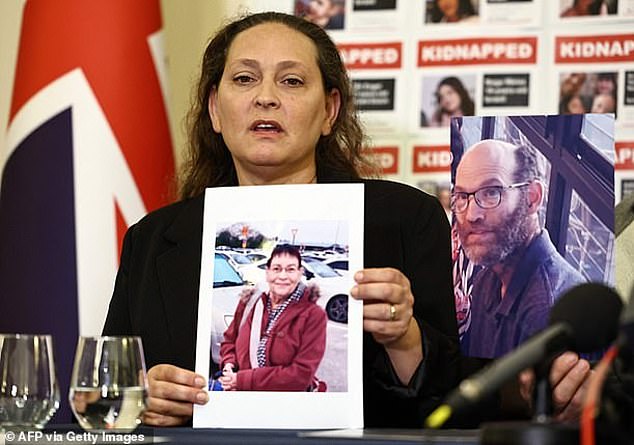Last October, Keir Starmer sat down on the plush green sofa of the Downing Street White Room and looked into the eyes of the families of the hostages who were snatched away by Hamas the previous year. It was, he said, a profoundly moving moment.
For a while he listened to their harrowing stories. Then talk turned to the wider Gaza situation and the search for peace.
‘We do indeed want to see a ceasefire – we believe that this is the right way to move forward towards the liberation of the hostages and the end of the suffering in Palestine,’ Sir Keir said.
‘But as you have emphasised to me, first and foremost, the hostages must be released. That is the first thing we must think of when we discuss these matters. Immediately and unconditionally.’
The families left with the understandable impression the Prime Minister had just pledged to make their plight his priority.
They were wrong. On Thursday Starmer was pressed on his announcement he was preparing to recognise a Palestinian state. Would the fate of the hostages still be taken into consideration?
‘I particularly listen to the hostages,’ he said. But then added: ‘Alongside that, we do need to do everything we can to alleviate the humanitarian catastrophe in Gaza, where we are seeing the children and babies starving for want of aid which could be delivered. That is why I’ve said unless things materially change on the ground, we’ll have to assess this in September, we will recognise Palestine.’

Last October, Starmer sat on the plush green sofa of the Downing Street White Room and looked into the eyes of the families of the hostages who were snatched away by Hamas
It’s official. The hostages are no longer Keir Starmer’s first thought. If they ever really were.
A lot of the criticism of Starmer’s announcement on Palestinian statehood has focused on its contorted, Kafkaesque logic. As written, it turns on its head Labour’s previous policy of granting recognition only as part of a peace initiative, and now states recognition will be granted if Israel refuses to embark on such a process.
Which, in turn, clearly incentivises Hamas to sabotage any peace plan. As one minister told me: ‘It’s mad. It’s telling Hamas they should scupper any process and hold out for a better deal. And they’re not stupid. They can see that.’
The hostage families can now see it, too. Ayelet Stavitsky, whose relatives Nadav and Roi Popplewell were killed on October 7, described the Government’s new stance as ‘a prize to Hamas for the murder of my two brothers’.
Following a meeting at the Foreign Office, the families’ lawyers issued a formal statement saying ‘the ‘‘vision for peace’’ which the UK is pursuing, and which the families heard much about last night, may well involve our clients’ family members continuing to rot in Hamas dungeons’.
A number of Labour insiders I spoke to last week attributed Starmer’s shift to coercion from within the Cabinet and wider Parliamentary Labour Party.
‘When he’s put under pressure, he caves,’ one minister said. ‘He can’t hold the line on anything.’

At that time, Starmer said that for any ceasefire to be agreed, ‘first and foremost, the hostages must be released’
It’s a common rationalisation of Starmer’s leadership style, following U-turns from winter fuel, through the rape gangs inquiry, to benefits reform. One I’d come to share. But the events of the past week have altered my view. The Prime Minister isn’t just weak. He’s a politically shallow, manipulative charlatan.
On Friday I spoke to a member of the Jewish community who was heavily engaged with Starmer’s outreach prior to the election. They were in the room as he delivered a series of heartfelt entreaties over how his party had changed, the anti-Semites had been purged and, under his leadership, Israel had a true and valued friend.
‘People feel betrayed,’ they told me. ‘I just got a message from someone with a plane emoji. They said, “That’s it. I can’t take this any more. I’m leaving.”’
A second member of the community echoed that disillusionment. ‘I genuinely think that in his heart Keir believes everything he’s told us. It’s that he just can’t stick with it. He doesn’t have the political strength to stand up to people who oppose him.’
But that analysis is still excessively charitable. Because, from the very beginning, betrayal is what has underpinned his leadership. First it was the Left, who he skilfully seduced with a slick campaign video highlighting his work representing peace protesters and the unions, ten radical pledges and an assurance Jeremy Corbyn was his ‘friend’. Next up was the

Ayelet Stavitsky, whose brothers Nadav and Roi Popplewell were killed by Hamas, holds a photograph of her mother Channah, who was kidnapped and later released
Jewish community. Even as recently as last December, he was peddling the fiction he was their proud ally, and an ally of Israel. ‘This movement has returned to our history and heritage which is inseparable from the state of Israel and our Jewish family,’ he proclaimed to the Labour Friends of Israel annual dinner.
WASPI women. Pensioners. The disabled. The business community. The trans community. ‘Hard-working British people.’ It doesn’t matter their position on the political spectrum.
The pattern is the same. When someone’s deemed useful, Starmer will put an arm around their shoulder, gaze into their eyes and with unflinching sincerity promise they are his priority.
And they will be. Right up to the moment they are no longer politically useful, or taking up space from someone who is. At which point they will find themselves casually and callously ditched. All politicians operate with a degree of cynicism. But Sir Keir made great play of the fact he wasn’t going to be like other politicians.
And all successful politicians at least have an anchor. Some deep, tiny recess of their soul that dictates ‘there’s a line for me there. I’m not crossing it’.
Starmer does not have that line. Or if he did, it was erased on the day he decided he wanted to be Prime Minister. I was once told by a member of the Cabinet ‘international law is a principle Keir won’t violate. It’s a religion to him’. Until last week, when warnings his announcement breached established principles surrounding state recognition were brushed aside by his ally Lord Hermer.
A couple of months ago, following Starmer’s claim Britain was becoming ‘an island of strangers’, Plaid Cymru leader Liz Saville Roberts rose in the Commons and asked him: ‘Is there any belief he holds which survives a week in Downing Street?’
Angered, he told her she was talking rubbish. Then a couple of weeks later disowned the phrase.
The events of the past seven days have conclusively proved Saville Roberts is right. As Prime Minister, Keir Starmer holds no meaningful beliefs. And the reality is, if he is prepared to betray the families of those murdered, tortured, raped and kidnapped by Hamas, he is prepared to betray anyone.












